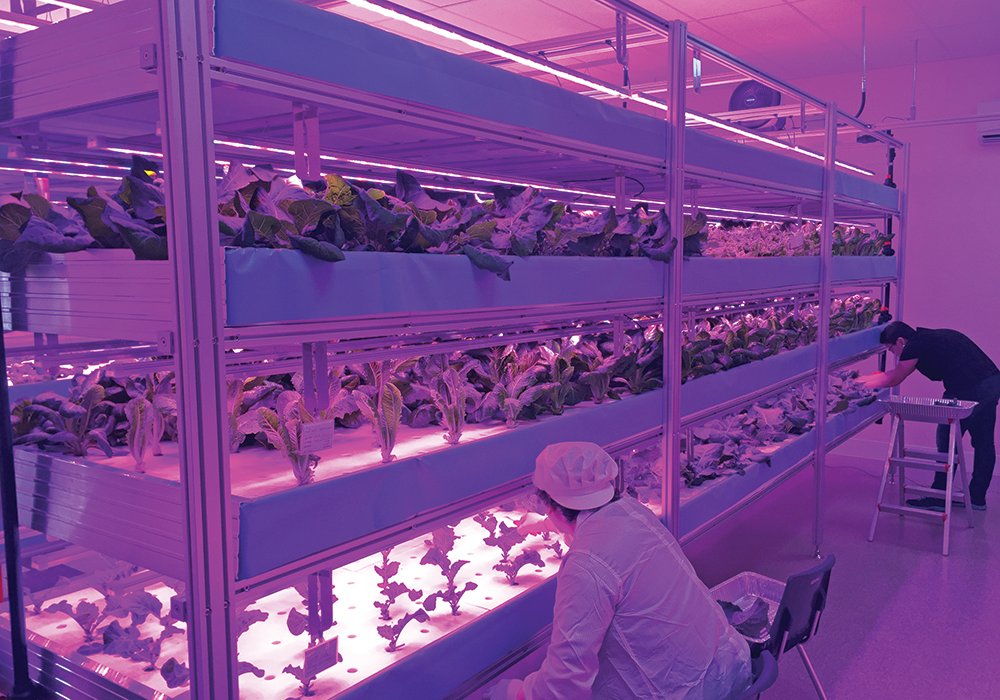First Nations farm focuses on health

Stephanie Cook planned on a career in family services. She never imagined that would lead to operation of a vertical farm that helps feed her northern Manitoba community.
As a member of Opaskwayak Cree Nation (OCN) near The Pas, 600 kilometres north of Winnipeg, Cook grew up surrounded by the impacts of colonization and the legacy of residential schools.
The shared past of the settler community and First Nations continues to cause tensions in the region, and OCN is home to many longstanding challenges that exist on reserves across Canada. Those include a high rate of health issues related to poor access to good nutrition.
As Cook embarked on a career in child and family services, she focused on issues related to poverty in her community. She quickly realized the intersection between poverty and food security in a climate known for long, harsh winters and reliance on imported goods.
“Being in that setting, it made me realize, ‘OK, things in food security need to change,’ ” she says.
“Food security is probably one of the biggest issues for low-income families, and those families are always at risk of whatever it may be. There (are) some people who are naive to the fact that after the 53rd or 52nd parallel, it becomes a food desert.”
Though the community has more than one grocery store, costs are high even when adequately stocked, says Cook. In some weeks there is no chicken; other weeks there is no red meat. The cost, availability and quality of vegetables shipped in from the south make them an unpalatable option for many.
A simple favour led to creation of the Opaskwayak LED Smart Farm.
It began when a group of local hunters assisted a team of surveyors from South Korea who were doing contract work for Manitoba Hydro. The Koreans had become stuck in the mud in a remote area and were helped by the locals.
When that team returned to South Korea, a country that is a leader in vertical farming technology, members connected the community with researchers and commercialization specialists who helped launch Manitoba’s first “smart” vertical farm in early 2016.
The project is part of ongoing research at the University of Manitoba on ways to improve affordable access to nutritious food in communities vulnerable to food insecurity.
The project recently received a fresh injection of federal support to further develop it as a sustainable local food resource and provide opportunities for technical and entrepreneurial training.
“Food is a basic entry point for building healthy communities,” said project co-leader and University of Manitoba food and nutritional science professor Miyoung Suh, in a July release that announced the funds.
“The availability of fresh produce up north is limited, but smart technology involving local food production could be a simple solution in transforming those communities. Funding from the Healthy Cities Research Initiative will enable us to identify and tackle problems around the accessibility of healthy food systems and also train future leaders with the expertise to support healthy communities and cities.”
Sixteen vegetable beds with a full spectrum of LED lights are now helping the community grow produce almost year-round.
Cook had been in her planned career in social services only briefly when she learned about the food project in 2016. She applied for the manager position despite initially thinking the concept was “like an alien planet” and without any agriculture-related expertise.
Since the farm opened, however, she has found it to be a powerful tool for accomplishing some of the same goals that led her to social services as a career — building community, combatting food insecurity and fighting chronic disease. It has helped set the stage for other development.

“Basically, what we’ve done is started to establish contacts within the community working towards … reconciliation, food security, food stability in the north and food sovereignty,” says Cook.
The farm assists in many ways. Cook and her colleagues work with schools, care homes and health facilities in OCN to provide nutritious food. A restorative justice component allows people to fulfil community service obligations at the farm.
“It’d be awesome to see other communities kind of work towards this model, especially in First Nations communities, because we’re working towards reconciliation,” Cook says.
The success of the OCN farm has led to exploratory talks about expansion and added components such as a food co-op for residents.
That growth is needed because food insecurity and malnutrition challenges continue, says Cook.
“Even for myself as a single parent, like before, I had my job. … Even now, I still have moments of struggle, where, you know, I don’t know what I’m going to do to make ends meet.”
Source: producer.com

